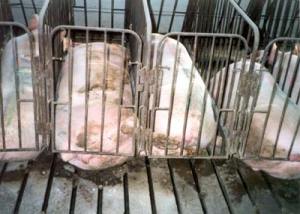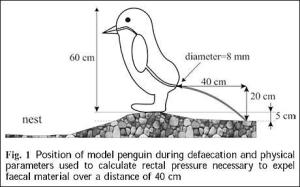Recently I came across a discussion about pig research, pets, and the role of science in animal welfare. (For the entire blog, well worth reading, go here.) Thanks Barbara King, you got me thinking about what has become a conundrum for scientists, animal-lovers, meat-lovers, and vegetarians alike.
To give you some background: the pig research discussed is a somewhat unusual study, unusual in that the researchers were exploring the question of how to enrich the lives of farm pigs that are destined for slaughter. The study is titled “Autonomic reactions indicating positive affect during acoustic reward learning in domestic pigs,” and written by scientists at Germany’s Institute for Farm Animal Biology.
To summarize, the researchers took 24 domestic pigs and exposed them to a “cognitive challenge integrated into their familiar housing environment”. Pigs were rewarded with food after they mastered the discrimination of a particular sound followed by an operant task (pressing a red button). Not surprisingly, the pigs learned quickly to complete the correct series of tasks necessary to receive food (e.g. hear a certain sound, press red button). While this process was happening, the researchers kept tabs on some baseline physiologic data of the pigs, namely heart rate and its variability. To summarize the study’s findings in the authors’ own words,
“We concluded that the level of cognitive challenge was adequate and that the observed changes in the autonomic tone, which are related to different dimensions of the affective response (e.g. arousal and valence), indicated arousal and positive affective appraisal by the pigs. These findings provide valuable insight into the assessment of positive emotions in animals and support the use of an adequate cognitive enrichment to improve animal welfare.” (Emphasis mine.)
In other words, they are suggesting that when pigs were allowed to provide themselves with a food reward, when given the opportunity, they had a physical reaction that might be viewed as positive. In other words, research pigs housed in a lab seemed to like giving themselves a snack.
Are we really scratching our heads, wondering how in the world we can improve the welfare of the modern day factory farmed pig? These are highly intelligent animals housed in extremely cramped living conditions, females confined for their lives to cruelly small crates for gestation and nursing (photo, left), fed pounds of antibiotics to resist the spread of disease in such dense, unclean conditions, and doomed for slaughter? And yes, the experimental pigs were slaughtered subsequent to the study.
Can we please point out the sentient, intelligent, able-to-feel-love-and-pain elephant in the living room: I contend that we don’t need one more study that tells us what our instincts, or if you prefer, intuition, or better yet, common sense tells us. And if common sense isn’t good enough, how about the collective knowledge of independent family farmers over the centuries? This study applauds the finding that pigs, seriously confined and enduring lives of deprivation and often pain, never getting to express their naturally evolved behaviors – get excited when allowed to give themselves a treat. Just not earth-shattering as eureka moments go. And who in this world of struggling economies funds such hooey? I call it such not for its lack of baseline scientific rigorousness, but that’s just the problem.
If a scientific experiment on animals is cruel, or ignores the role cruelty plays in the system being studied, but still diligently pursues objectivity, rigorousness, and the rules of adequate experimental design and statistical analysis, does this mean it is valuable and should be funded?
Where is that debate among ethical scientists? And why is there a tangible avoidance of this topic by otherwise compassionate, intelligent people? (And if research considered valid is not rigorously done, what then? Go here for an article in the Guardian on a new investigation that reveals how many tests are full of flaws.)
If such a debate sounds subjective, it should, since we as humans are highly subjective creatures living in a subjective world of preferences and judgment when it comes to what we consider valuable. But the margins of subjectivity should overlap with a serious discussion of ethics when the topic – and the research – directly impact the lives and welfare of other sentient beings.
 While always eschewing subjectivity as scientists, we accept the very subjective determination that testing on humans against their will to be unethical, therefore not allowed, and obviously not funded. This is relatively new determination, where as recently as the mid-20th century men, women, and children were unwilling experimental subjects – not only at the hands of Nazis in Germany, but other scientists in Russia, Japan, China, and even the United States. The United State’s infamous Operation Paperclip gave sanctuary to several of these scientists, one who helped research the hardy bacteria that now causes devastating Lyme disease.
While always eschewing subjectivity as scientists, we accept the very subjective determination that testing on humans against their will to be unethical, therefore not allowed, and obviously not funded. This is relatively new determination, where as recently as the mid-20th century men, women, and children were unwilling experimental subjects – not only at the hands of Nazis in Germany, but other scientists in Russia, Japan, China, and even the United States. The United State’s infamous Operation Paperclip gave sanctuary to several of these scientists, one who helped research the hardy bacteria that now causes devastating Lyme disease.
Can we not, both in the scientific world of our peers, and in the public court of moral considerations regarding the lives of non-humans, begin having a serious dialogue about what studies are truly valuable, as well as ethical? I don’t believe the definitions of these terms, valuable and ethical, are mutually exclusive.
Now we are getting to the heart of the taboo subject: The belief by many scientists and their peers that, by striving for objectivity in the scientific methodology of an experiment – as is appropriate – we scientists by default must make our entire existence and day-to-day lives more objective; an unquestioned goal to strive for. Not only is this naive, it is a dangerous illusion.
Along those lines of thinking it is widely accepted that the expression of any viewpoint or opinion about the subjects on which scientists experiment – despite such opinions being expressed outside the realm of experimental reporting – are deemed to weaken respectable reputations and erode scholarly personae. By purporting to have no strong opinions on research of questionable value and ethics, these same scientists are viewed by their peers as more astute and better prepared, ironically, to make judgement calls about what is acceptable behavior when it comes to how humans use sentient, feeling non-human animals in research.
Incidentally, if you think only those studying animal science in laboratories are guilty of this behavioral fallacy, think again.
It is common practice for us wildlife researchers, such as a biologist radio-tracking lions, not to give their research subjects human names due to the idea beaten into our heads as graduate students that to do so risks our getting too ’emotionally attached’ to the animals we have decided to spend our lives studying. This idea is founded upon the assumption that emotional attachment – such as having compassion for the welfare of your subjects – is believed to, by its mere existence, eliminate objective or analytical thinking by the scientist towards their research. I can honestly say this assumption is wholly without merit. I have given human names to over a dozen radio-tagged wild anacondas, a bunch of banded birds, and a few collared capybaras, the latter being very high on the cute scale. I conducted objective research and analyses on them all, and while I made it a priority to minimize any negative impact my involvement in their lives had on their welfare, I also resisted inviting them to dinner, teaching them circus tricks, or setting up a college fund for any of them. (However there was that one time emotions got the upper hand, and I let an anaconda drive without a license.)
I call foul on the entire subjective-objective zeitgeist. We may think logically and analytically, conduct experiments as objectively as possible, but in our motivation and daily decisions we remain feeling, emotion-driven, fear-driven, pleasure- and pain-driven creatures from birth to death, and we consider empathy to be one of the most enlightened and evolved of those emotions. It is because of this fact we should be able to relate to animals better than we do as a society, since we are not so different as we’d like to believe.
What precludes us from being highly analytical and rational, emotional and passionate, and ethical, all wrapped up in one thinking mind and body, all at the same time? Nothing, actually, many of us manage these complex cranial conundrums, with compassion, every day. Many simply don’t like to admit it, if they are scientists; when convenient they ascribe to the cop-out that passion is the equivalent of irrational behavior, especially whenever the idea is whispered that considerations of animal welfare is a basic ethical responsibility.
Bewar e when scholars or scientists (or anyone else) criticize an opponent by equating the mere existence of emotions or compassion – the essence of being human – with irrationality, unprofessionalism, or lack of scholarly aptitude, for they do so to give credence to their rationalization for committing irresponsible or unethical acts.
e when scholars or scientists (or anyone else) criticize an opponent by equating the mere existence of emotions or compassion – the essence of being human – with irrationality, unprofessionalism, or lack of scholarly aptitude, for they do so to give credence to their rationalization for committing irresponsible or unethical acts.
Go ahead and thank Francis Bacon’s ghost for giving the scientific method clarity, but I wouldn’t recommend embracing his philosophy on life, especially when the man claimed “He that hath wife and children hath given hostages to fortune; for they are impediments to great enterprises, either of virtue or mischief,” and was also known to say, “it is impossible to love and be wise.”
It is passion, compassion, and courage – not objectivity – that drives us to do wonderful things, make historical discoveries, create beautiful masterpieces, be heroes in our own lives. Objectivity belongs in the scientific method, which is an inanimate process. Those who apply the process are human; innately full of reason, emotion, and hopefully a moral imperative to do what is ethical.
This essential discussion should not be limited to a war of words between animal rights groups and medical laboratories, it should be a required discussion among scientists and others, and it should include serious debate about the value of entire groups of experimentation. Isn’t it time we started calling out the plethora of research that is really telling us something we already know*, (or don’t need to know), even if it hasn’t been assigned a statistical p value, and especially when such research subjects other sentient beings to hardship at the very least?
Do we really need studies such as these to learn how to enable pigs – like those pictured below – to live healthier, and happier lives, even if they end on the dinner table? It does not require a PhD to understand the amoral profit motives of capitalism that drive cruel and environmentally destructive factory farm practices, endorsed by mass public denial. It is not thanks to science – or mere anthropomorphizing – that we can all agree that the pig pictured at the top of this blog (with my mother, at Farm Sanctuary) is happier than the ones pictured below; as it is allowed to pursue innate, natural behaviors in a relatively well-fed, comfortably housed environment where pain and stress are not ignored as an unimportant consequence necessary to promote enhanced profit, medical research, or otherwise.
 Most animal researchers aren’t making millions or listed in the Fortune 500, although most do live quite comfortably. So what really motivates them? A key question here resides in asking what drives some to live their lives embracing ethical ideologies in their careers and daily lives, while others who behave morally and compassionately in other facets of their lives can rationalize away or sublimate these ethics under the guise of scholarly research, advancing scientific knowledge, or tenure promotion.
Most animal researchers aren’t making millions or listed in the Fortune 500, although most do live quite comfortably. So what really motivates them? A key question here resides in asking what drives some to live their lives embracing ethical ideologies in their careers and daily lives, while others who behave morally and compassionately in other facets of their lives can rationalize away or sublimate these ethics under the guise of scholarly research, advancing scientific knowledge, or tenure promotion.
And when does this transference from compassion to rationalization occur? In graduate school? When one’s career is taking off? When tenure is pending? When a bigger house is desired? Or when peer pressure rewards competitiveness and denial over all other considerations? Perhaps it begins much earlier, when we as children learn to ignore what our conscience tells us is right, in our imitation of adults.
It follows that we parents and teachers need pay special attention to how we embrace compassion for all, especially as we set an example for those in their more formative years.
To sum up: I’m not a farmer, and I don’t have pet pigs. However, I know how to make my dogs happier, and how to enhance their welfare, through a connection I have made with them that has little to do with science or rigorous experimentation. I have done so subjectively, yet successfully, through developing a conscious awareness very much bound up in that incredibly subjective thing called love, and also respect. Sure, I’ve used some cues from my knowledge of canine behavior, but mostly I use intuition and observations based on a desire for all of us to be happy, as much as can be achieved living in a human dominated world with human directives. I have not conducted one single controlled experiment on them, I have no p, z, t, F, or chi squared value to support my conclusions on how to make my dogs happier. But I have results, based on what I feel, and my observations of their actions, feedback, their state of health, and sincere efforts on behalf of all parties to understand the language of another species.
I daresay that no one need develop a study to demonstrate that my happiness, upon seeing my dogs content, is real. Neither need anyone pursue statistically significant data that represent my autonomic system being positively stimulated. As far as my dogs go, if you can’t take my word for it that they are happy, you will have to ask them. But be advised – you’ll have to get them to put the ball down long enough to do so, and don’t even ask to share the couch after dinner.
* For those out there familiar with studies like Harry Harlow‘s famous surrogate mother macaque experiment, do you wonder that mothers worldwide didn’t exclaim loudly about the obvious conclusion they already knew: that babies (of intelligent, sentient, social animals) need not only food, but nurturing and love in their early development to thrive? The idea that we need scientists to tell us this after thousands of years on this planet as Homo sapiens is, well, disturbing.






Renee, it’s great that you’ve taken this topic further, and I liked your post a lot. In particular I liked this point about sources of knowledge regarding what animals need to thrive in the environments we put them in:
>> And if common sense isn’t good enough, how about the collective knowledge of independent family farmers over the centuries, if we are talking livestock.
Exactly so.
As a person working in an academic context, I would like to see a much more aggressive role for ‘animal care committees’ at universities and runiversity-affiliated esearch centers. As you know, these committees are charged with making sure experiments proceed in an ethical way for the animals’ sake. However, judging from the approvals given to all kinds of experiments that go forward and are written up in the literature (and from some personal experience with this matter), it strikes me that these committees have very weak standards- if an animal’s pain is being “managed”, or if the experiment is rigorously structured in terms of its methodology, there may be very little attention if any to the issues you raise (what is valuable and necessary research?) much less to truly humanitarian and compassionate principles. Here is an area ripe for agitation and reform.
By: Barbara on January 26, 2011
at 12:59 am
Very nicely written, Renee! As you know, I’m a fan of balance in the animal/research debate, recalling that the development of the polio vaccine in the 1950s, as an example, would never have happened had mice and monkeys not been used in the research. I’m not sure how society should codify the effort to establish an appropriate balance between [real] human needs and the unvolunteered contributions of animals, but consciousness-raising of all kinds — as you have contributed to here — would seem to be an important part of the process.
By: Peter Salk on January 26, 2011
at 1:21 am
I felt this piece demonstates how kids can learn to apprecate the role of animals in our world.
By: Eva Kerckhove on January 30, 2011
at 12:19 am
Thanks, Eva – I think you meant to comment on the post before this one, but point taken, and appreciated!
By: Renee Owens on February 2, 2011
at 10:09 pm
We sholud be renamed homo oxymorons. Isn’t it mind boggling to improve the mood of a pig that can’t move by giving him other stimuli? How about just giving him more space? I’m definitely for defining value/real need in testing. I think we know that putting draino in a rabbit’s eye is going to cause severe damage. And yet we repeat these types of torturous experiments over and over again in the names of eduation and progress. It’s nothing but cruel. Especially when we have alternatives.
By: Cheryl Reiff on February 2, 2011
at 7:14 am